Court Marriage Explained | Eligibility Criteria For Court Marriage in Pakistan
Court Marriage in Pakistan: Compliance with State Laws and Regulations
Court marriage in Pakistan presents a formal, legal alternative to traditional wedding ceremonies typically rooted in religious or cultural customs. This lawful union is officiated by a government-designated authority, ensuring that the marriage complies with state laws and regulations. Unlike traditional marriages, which often involve elaborate customs and rituals, a court marriage focuses on a straightforward, legally binding process.
The Robust Legal Standing of Court Marriage in Pakistan
The legal standing of court marriages in Pakistan is robust. The procedure adheres strictly to the provisions of the Pakistani Marriage Laws, such as the Marriage Act and the Muslim Family Laws Ordinance. This adherence underscores the legitimacy and governance of the marriage by the state. Both parties are required to fill out necessary documentation, provide valid identification, and have witnesses present during the procedure. A marriage certificate is issued upon completion, which serves as official proof of the union.
Court Marriage in Pakistan: Overcoming Familial Resistance
From a social perspective, court marriage often appeals to couples seeking a private, no-fuss alternative to a traditional wedding. It is particularly popular among those wishing to avoid the elaborate and, at times, costly ceremonies associated with cultural nuptials. This form of marriage also offers versatility, making it a viable option for interfaith couples or those facing familial resistance.
Streamlined Process of Court Marriage in Pakistan for Quick Legal Validation
Moreover, court marriages provide a streamlined route to legal recognition and protection for the married couple. For those whose personal circumstances necessitate a fast, legally recognized marriage, the court marriage process is an efficient solution. As Pakistan progresses, the significance of court marriages continues to grow, not just as a symbol of legal compliance but as a reflection of the evolving social fabric of the country.

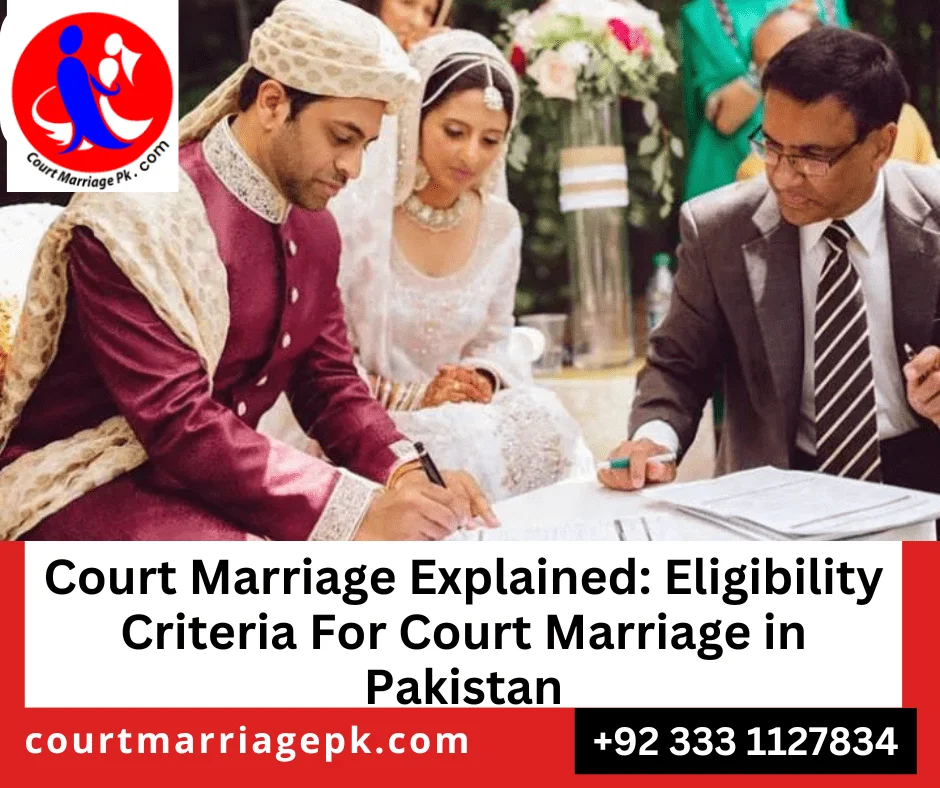
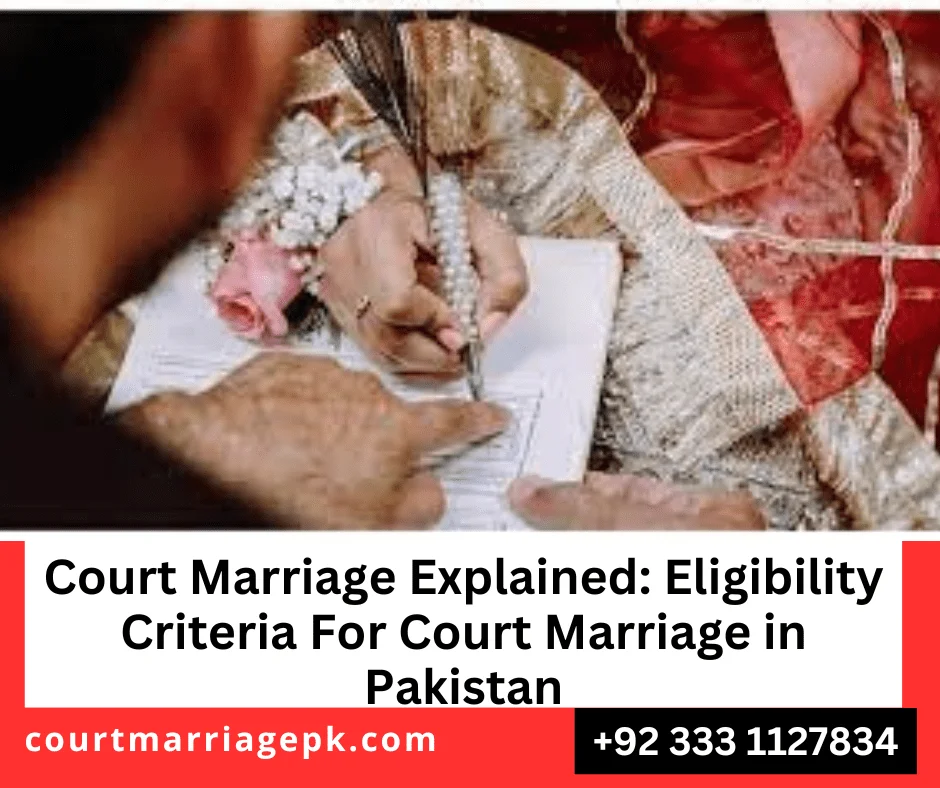
Eligibility Criteria for Court Marriage in Pakistan
To engage in a court marriage in Pakistan, couples must meet specific eligibility criteria, ensuring their union is legally recognized. One primary requirement is the age restriction. According to Pakistani law, the legal age for marriage is 18 years for both males and females. However, in some jurisdictions, the age requirement for males can be 21 years. Couples must provide proof of age through National Identity Cards (NICs) or valid birth certificates.
Court Marriage in Pakistan: Proving Single, Widowed, or Divorced Status
Another critical eligibility criterion pertains to the marital status of the individuals involved. Both parties must be single, widowed, or legally divorced. Those previously married must present documentary evidence of their current status, such as death certificates for widows or divorce decrees for those divorced. This ensures no legal impediment exists for marrying again.
Legal Requirements for Parental Consent in Court Marriage in Pakistan
Consents and approvals are essential for the legitimacy of the court marriage. While Pakistani law allows adults to decide for themselves, parental consent may enhance the process by reducing potential familial and societal conflicts. In cases involving individuals under specific conditions, especially where Both parties are age 18, parental consent is mandatory for proceeding with the marriage.
Eligibility Criteria for Court Marriage in Pakistan: Marital Status Requirements
The eligibility criteria also encompass interfaith couples and foreign nationals looking to solemnize their marriage under Pakistani law. Interfaith couples face no legal restrictions under the country’s secular marriage laws, but must bear in mind potential religious and societal implications. Likewise, foreign nationals must comply with Pakistani legal prerequisites and provide valid proof of identity, such as passports, and complete the required paperwork.
The Role of the Nikah Nama in Court Marriage in Pakistan
Finally, the completion of a legally binding marriage contract, known as the “Nikah Nama,” attested by an authorized Nikah Registrar, is imperative for the union’s recognition. This ensures that all court marriages align with legal standards and are henceforth acknowledged.
Understanding the Application Process for Court Marriage in Pakistan
In Pakistan, the application process for court marriage requires a clear understanding of the steps and meticulous adherence to all administrative protocols. Couples who intend to solemnize their marriage through court must first seek legal assistance. Engaging a lawyer who specializes in family or matrimonial law can be invaluable. Legal counsel ensures that necessary documentation is accurately prepared and guides the couple through the procedural intricacies.

Court Marriage: Step-by-Step Application Process in Pakistan
The initial step in the application process involves both individuals submitting their respective National Identity Cards (NICs). Copies of these documents, along with two recent passport-sized photographs of each person, are mandatory. In addition, the couple is required to present an affidavit indicating their intent to marry, which must include details such as ages, marital statuses, and declarations of free will without any coercion.
Court Marriage in Pakistan: The Role of a Lawyer in Petition Preparation
Next, the lawyer prepares and files a detailed petition for court marriage on behalf of the couple. This petition is submitted to the Family Court, which has jurisdiction over such matters. Upon filing, a court fee is typically levied, and the filing documents must be stamped according to legal practice. This step is crucial as any errors or omissions in paperwork can lead to delays.
Scheduling and Attending the Hearing for Court Marriage in Pakistan
Once the petition is filed and accepted, the Family Court schedules a hearing date. Both parties are required to attend the hearing. During the court hearing, the judge confirms the identities of both individuals and ensures that all legal prerequisites for marriage are satisfied, including the consent of both parties. Witnesses may also be called to testify to the couple’s identities and willingness to marry.
Nikah Nama: Official Recognition of Court Marriage in Pakistan
Upon satisfactory verification, the court issues the marriage certificate, known as the ‘Nikah Nama’, formally recognizing the marriage. This certificate is not just a legal document but also serves as the official record of the marriage, ensuring that it is registered within governmental records. Therefore, the prudence in following every step rigorously cannot be overstated, as it substantiates the marriage’s legality under Pakistani law.
Required Documents for Court Marriage
Undertaking a court marriage in Pakistan necessitates the submission of several crucial documents to ensure the process is legally sound and properly documented. Prospective couples must provide accurate and up-to-date information to avoid any potential delays or legal complications.
Validating Identity with CNICs for Court Marriage in Pakistan
The first essential set of documents includes identification papers. Both parties must present their Computerized National Identity Cards (CNICs), which validate their identity and nationality. Should any individual have misplaced their CNIC, a valid passport or an alternative government-issued identification can serve as a substitute. Importantly, these documents confirm the compatibility of the personal details provided with official records.
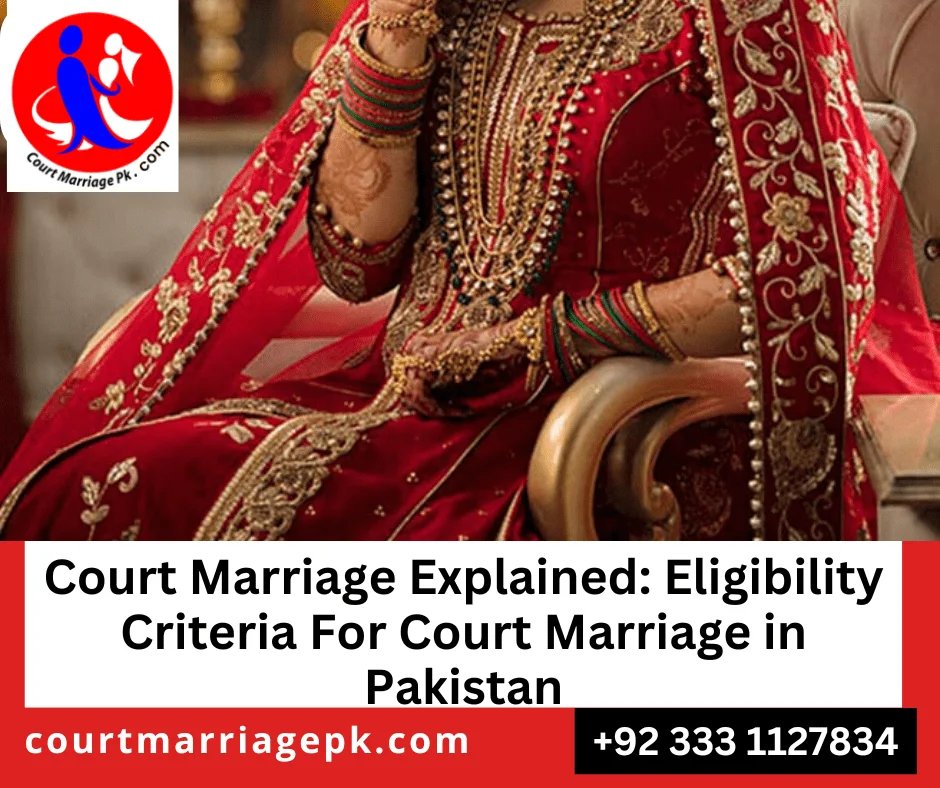

Establishing Legal Age Requirements with Birth Certificates and CNICs in Court Marriage in Pakistan
Proof of age is another mandatory criterion for a court marriage. This is typically established through birth certificates or the CNICs themselves, ensuring that both individuals meet the legal age requirement for marriage under Pakistani law. Additionally, proof of residence must be supplied, which can be demonstrated via utility bills, rental agreements, or any other authoritative document indicating the current residential address of each participant.
Marital Status Affidavits in Court Marriage in Pakistan
Marital status affidavits form a crucial part of the documentation. Both parties are obliged to provide sworn affidavits declaring their current marital status. This affirms that they are either single, divorced, or widowed, as applicable. These declarations are pivotal in preventing bigamous or unlawful marriages.
Navigating Institutional Constraints: NOCs and Other Requirements for Court Marriage in Pakistan
In some cases, additional certificates may be required by the legal authorities. For example, a divorce decree is imperative for divorced individuals, while death certificates of previous spouses are necessary for widows or widowers. In certain instances, a no-objection certificate (NOC) may be required, particularly if either party is serving in the armed forces or bound by any institutional constraints.
Timeline for Completing Court Marriage in Pakistan: What to Expect
Understanding the duration and costs involved in a court marriage in Pakistan is vital for planning purposes. The timeframe for completing a court marriage can vary, but typically, the entire process—from the initial application to the final registration—takes between one to two weeks. This duration encompasses the time required for the submission of necessary documents, verification, formalities, and the issuance of the marriage certificate.
Understanding Legal Fees for Court Marriage in Pakistan
The costs associated with court marriage in Pakistan are generally straightforward but can fluctuate depending on various factors. Legal fees are one of the primary costs, which primarily cover the fees of the legal advisors or law firms assisting with the procedure. The legal fees can range between PKR 15,000 to PKR 25,000, depending on the complexity of the case and the reputation of the advisor.


Budgeting for Court Marriage in Pakistan: Understanding Legal and Additional Charges
In summary, while the legal and court charges for court marriage in Pakistan are relatively predictable, additional expenses can significantly vary. It’s advisable to obtain an itemized estimate from legal advisors to better understand the potential financial implications. Planning and budgeting accordingly can ensure a smoother court marriage process, devoid of unexpected financial surprises.
Benefits and Advantages of Court Marriage
Court marriage offers a multitude of benefits that make it an appealing choice for many couples. One of the primary advantages of court marriage is the comprehensive legal protection it provides. Unlike traditional marriage ceremonies, a court marriage is formally recognized by the law, ensuring that the union is documented and enforceable under the legal framework of Pakistan. This legal protection can be particularly reassuring for couples, offering clarity and security for both parties.
Maintaining Intimacy: The Privacy Benefits of Court Marriage in Pakistan
Another significant benefit of a court marriage is the heightened level of privacy it affords. Couples who prefer to keep their nuptials low-key and intimate can greatly benefit from this option. Unlike traditional weddings, which often involve large gatherings and public ceremonies, court marriages typically take place in a more private setting, involving only a few witnesses. This allows couples to maintain a sense of privacy and discretion.
Court Marriage in Pakistan: Minimizing Wedding Expenses with Legal Simplicity
Cost-effectiveness is a notable advantage of court marriages. Traditional marriage ceremonies can be exorbitantly expensive, involving costs related to venues, clothing, decorations, catering, and more. In contrast, court marriages are significantly more budget-friendly, requiring only the necessary legal fees. This makes court marriages an attractive option for couples who wish to avoid the financial burden associated with traditional weddings.
Streamlined Nuptials: Court Marriage in Pakistan for Working Professionals
Moreover, court marriages are particularly advantageous for working professionals. The process is generally swift and does not require the extensive time commitments often associated with traditional marriage preparations. This efficiency allows professionals to manage their personal commitments without disrupting their professional responsibilities.
Protecting Partners’ Rights: The Legal Advantages of Court Marriage in Pakistan
In addition to these benefits, court marriage safeguards the rights of both partners, ensuring equal legal standing and protection. This is especially pertinent for couples who prefer a straightforward legal union that unequivocally protects their rights. For women, in particular, court marriage offers solid legal recourse in terms of marital rights, alleviating concerns related to dowries or socio-cultural pressures often prevalent in more traditional settings.
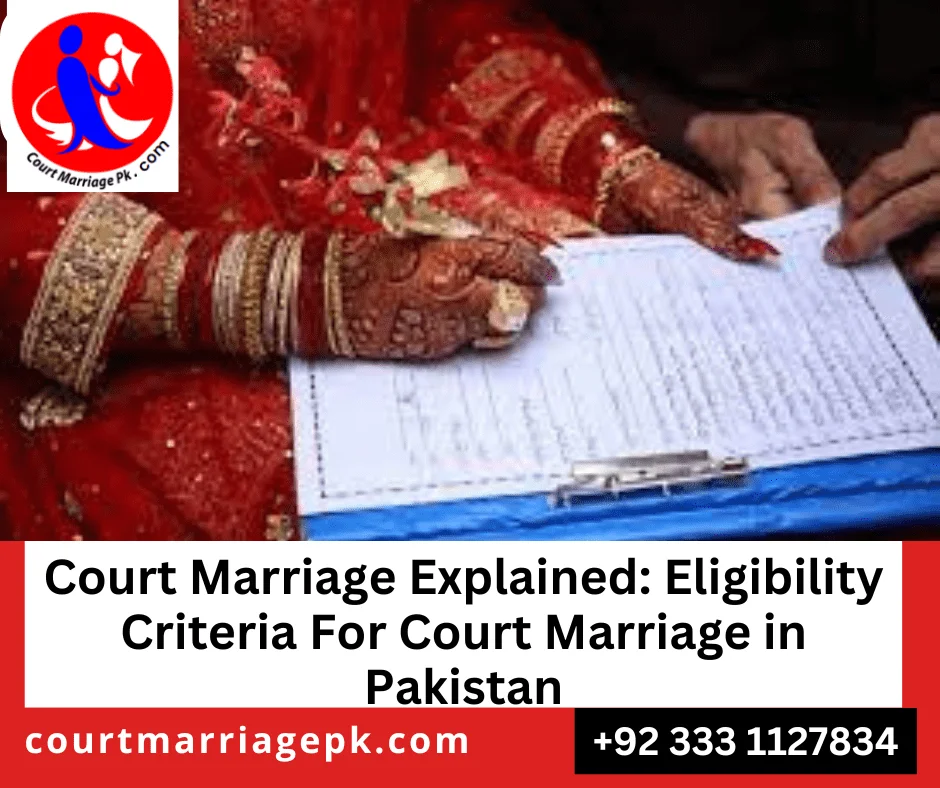
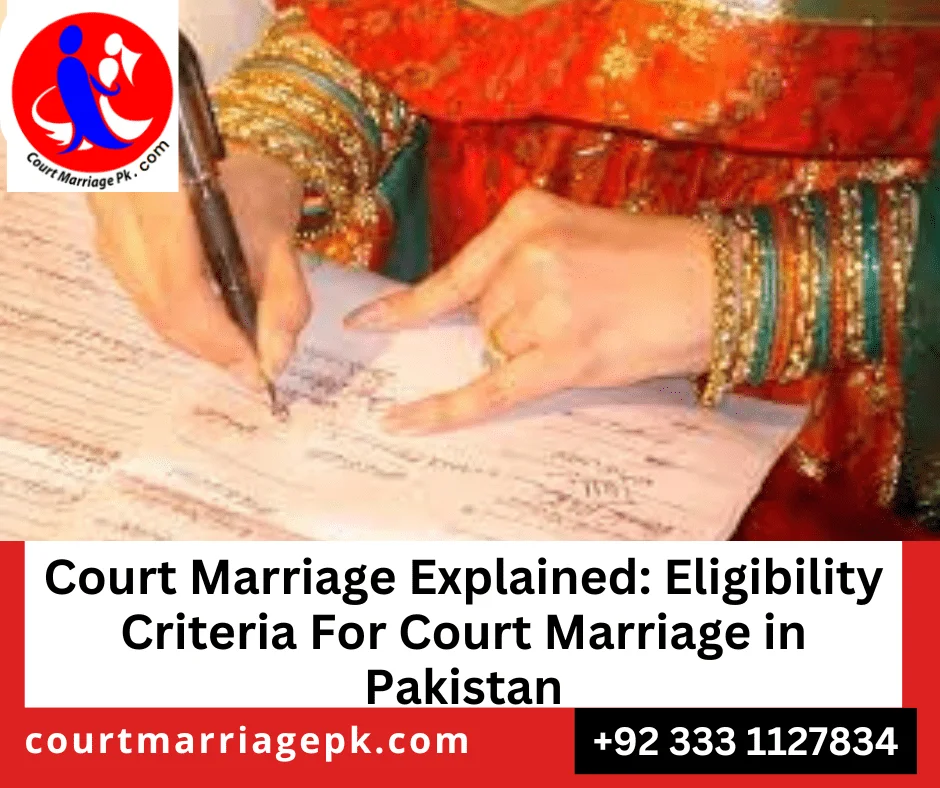
Court Marriage in Pakistan: Addressing Parental Concerns and Family Dynamics
While the legal provisions for court marriage in Pakistan offer a streamlined and often more convenient process compared to traditional ceremonies, they also come with their own set of challenges. For many couples, one of the foremost hurdles is navigating parental objections. Family members might have deep-seated beliefs about the sanctity and traditions of marriage, leading them to disapprove of a court marriage. This familial resistance can impact not only the couple but also broader family dynamics, sometimes causing long-lasting rifts.
Social Acceptance and the Challenges of Court Marriage in Pakistan
Societal attitudes towards court marriage can also serve as a significant impediment. In a culture where traditional ceremonies are deeply embedded, opting for a court marriage can be perceived as an act of defiance or non-conformity. Such perceptions may result in social ostracization or gossip, making it arduous for couples to gain social acceptance. These societal pressures can exert immense emotional strain on individuals, forcing them to reconsider or postpone their decision.
Balancing Legal Rights and Religious Expectations in Court Marriage in Pakistan
Religious considerations add another layer of complexity to the decision of opting for a court marriage. Islam, which is the predominant religion in Pakistan, emphasizes the importance of a Nikah, a formal contractual agreement witnessed by close family and friends. Although court marriages are entirely legal, they might not fully align with religious expectations, leading to potential conflicts between legal and religious norms. This could cause discomfort or create misunderstanding among those who hold stringent religious views.
Harmonizing Legal and Societal Expectations in Court Marriage in Pakistan
Despite these challenges, court marriages offer mechanisms to manage and mitigate these issues. The legal framework of court marriage ensures that the jurisdiction of family consent is not mandated, providing couples the autonomy to proceed without unnecessary hindrances. Furthermore, legal protection can offer a safeguard against familial and societal pressures, ensuring that couples can exercise their fundamental rights freely. Additionally, education and awareness about legal options and religious flexibility can aid in harmonizing societal attitudes toward court marriages.
Court Marriage in Pakistan: Legal Protections and Privacy Concerns
Court marriage in Pakistan encompasses various legal protections that safeguard the rights and interests of couples. The primary benefit of a court marriage is its lawful recognition, which provides both spouses with documented proof of their union, thus eliminating any ambiguity regarding their marital status. This is crucial in the event of any legal disputes or issues related to inheritance, custody, or alimony. Moreover, the marriage is registered under the family laws of Pakistan, ensuring that both parties are protected under the legal framework and have access to judicial remedies if required.
How Court Marriage Documentation Resolves Legitimacy Disputes in Pakistan
The judicial system in Pakistan has laid out procedures and protocols to handle disputes that may arise between married couples. In cases of domestic conflict or disputes about property and financial matters, court intervention ensures that a fair and impartial resolution is achieved. Additionally, the legal documentation of a court marriage serves as a credible reference in resolving any questions regarding the legitimacy of the marriage, thus preventing potential fraudulent claims.
Protecting Personal Data in Court Marriage Registrations in Pakistan
Privacy concerns are another significant aspect of court marriages in Pakistan. The legal framework is designed to protect the personal information of individuals who opt for a court marriage. All personal data provided during the marriage registration process is handled with strict confidentiality, and only authorized officials have access to these records. This minimizes the risk of unauthorized disclosure of sensitive information, thus safeguarding the privacy rights of the couple.
Controlled Access and Privacy in Court Marriage Documentation in Pakistan
The official handling of a court marriage also includes secure storage of marriage records, where only the concerned parties or legal authorities can retrieve these documents under specific conditions. This controlled access ensures that the privacy of couples is upheld while maintaining the integrity of the legal process. Personal details such as age, residence, and parental information submitted during registration are protected under privacy laws, fortifying the confidentiality aspects of a court marriage.
